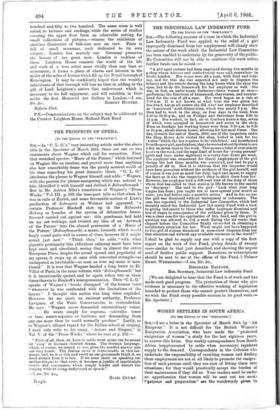THE INDUSTRIAL LAW INDEmisTrrr [To THE EDITOR . OF THE "SPECTATOR."]
Siz,—The following account of a case in which the Industrial Law Indemnity Fund was applied to the relief -of a girl improperly dismissed from her employment will clearly show the nature of the work which the Industrial Law Committee has been enabled to undertake by the generosity of the public. My Committee will not be able to continue this work unless further funds can be raised :— "A girl aged sixteen had been employed during five months in a shop where tobacco and confectionery were sold, somewhere in South London. Her wages were £8 a year, with food and lodg- ing-, and for this she was expected not only to dispense the tobacco and the sweets during the long hours when the shop was open, but to do the housework for her employer as welL She was, in fact, an unfortunate Cerberus—three women at once— performing, the functions of housemaid, charwoman, and counter- hand for the sum of .2.8 a year. Her work began as a rule at 7.30 a.m. It is not known at what hour she was given her breakfast, but at all events she did what her employer described as housework 'until dinner-time, which was nearly 3 p.m. • She then had to work in the shop, on four days in the week, from 3.30 to 10.30 p.m., and on Fridays and Saturdays from 8.30 to 11 p.m. She worked, in fact, about fourteen hours a day, seven of which were occupied in housework and seven in the shop. Even on Sundays her working hours were from 930 a.m. to 9.30 or 10 p.m., about eleven hours, allowing for her mealtimes. One day, towards the end of March, 1899, one of the inspectors under the Shop Hours Acts visited the shop, looked in vain for the notice' which the law requires to be' exhibited,' and ascertained from th e poor gi rl, aged sixteen, that she work ed about thirteen hours a day on seven days in the week. This means a total of over ninety hours in the week, and the legal limit of hours for 'young persons' (girls and boys under eighteen) is seventy-four hours per week. The employer was summoned for illegal employment of the girl during the last three months, was convicted, and had to pay a penalty of 43 4s. Now it is obvious that the inspector would have been powerless without the evidence of the girl herself, and of course it was just as much her duty, legal and moral, to supply the facts as it was the inspector's duty to elicit them from her. However, her employer took a different view of the duty of those whom God has called to that station in life known to the candid as drudgery: She said to the girl : 'Look what your long tengue has done; you ought not to have opened your mouth eh wide ; you had better take a month's notice.' And in due course the girl was dismissed without testimonial or references. The case was reported to the Industrial Law Committee, which had recently raised the Industrial Law Indemnity Fund with a view to giving indemnity to those who suffer improper dismissal and loss of wages in consequence of the evidence given by them. It was a clear case for the application of this fund, and the girl in question was allowed 8s. 11d, a week during the six weeks that elapsed before the Committee finally succeeded in obtaining a satisfactory situation for her. What might not have happened to this girl of sixteen dismissed in unmerited disgrace from her first situation and without any available resources in the world?" I shall be glad to supply any one with a copy of the first report on the work of this Fund, giving details of twenty cases similar to that just described, and showing the urgent need of further public support. Donations or subscriptions should be sent to me at the offices of the Fund, 5 Palmer Street, Westminster.—I am, Sir,
REGINALD BALFOUR,
Hon. Secretary, Industrial Law indemnity Fund. [We are delighted to hear that the Fund is at work and has Made such good progress. The protection of those who give evidence is necessary to the effective working of legislation intended to protect those who cannot protect themselves, and we wish the Fund every possible success in its good work.— En. Spectator.]






































 Previous page
Previous page